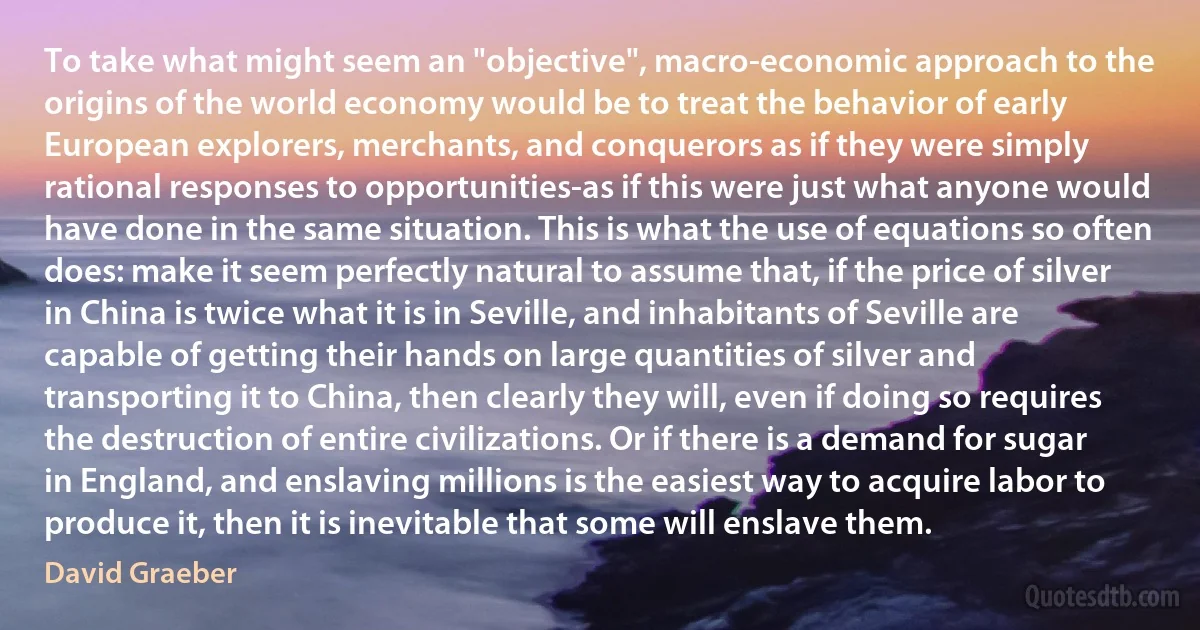
To take what might seem an "objective", macro-economic approach to the origins of the world economy would be to treat the behavior of early European explorers, merchants, and conquerors as if they were simply rational responses to opportunities-as if this were just what anyone would have done in the same situation. This is what the use of equations so often does: make it seem perfectly natural to assume that, if the price of silver in China is twice what it is in Seville, and inhabitants of Seville are capable of getting their hands on large quantities of silver and transporting it to China, then clearly they will, even if doing so requires the destruction of entire civilizations. Or if there is a demand for sugar in England, and enslaving millions is the easiest way to acquire labor to produce it, then it is inevitable that some will enslave them.
David GraeberRelated topics
anyone approach done early easy enslaving entire getting labor large might natural objective price produce silver situation sugar take transporting treat use way world handsRelated quotes
It must always be borne in mind that each and every individual is not only a producer but a consumer. In the final analysis of our conditions, we have to admit that it is not lack of consumption, but lack of production which is our present economic danger. The immigrant is needed, provided this fact is overcome, provided supply-whether in schools, in homes, or in shoes-does not fall behind demand. The public could today consume much more of the necessities of food, shelter and clothing than they are able to procure or have ever been able to procure in a country where the standard of living is so high. If, through cheap labor, and an increased willingness on the part of alien labor to live on the edge of existence, these standards are threatened, then is the time to bring legislative action to bear on the situation.

Calvin Coolidge
I am told that there are still left over 18,000 Hindus and Sikhs in Rawalpindi and 30,000 in the Wah Camp. I will repeat my advice that they should all be prepared to die rather than leave their homes. The art of dying bravely and with honour does not need any special training, save a living faith in God. Then there will be no abductions and no forcible conversions. I know that you are anxious I should go to the Punjab at the earliest moment. I want to do so. But if I failed in Delhi, it is impossible for me to succeed in Pakistan. For I want to go to all the parts and provinces of Pakistan under the protection of no escort save God. I will go as a friend of the Muslims as of others. My life will be at their disposal. I hope that I may cheerfully die at the hands of anyone who chooses to take my life. Then I will have done as I have advised all to do.

Mahatma Gandhi
If you were part of a group there was always the chance that the predator would take the next guy, not you. It was a cold-blooded lottery that paid off often enough to be worthwhile adapting for.
But there were disadvantages to group living: mainly, if there were large numbers of you, there was increased competition for food. As that competition resolved itself, the inevitable result was social complexity-and the size of the adapids' brains had increased so that they were capable of handling that complexity. Then, of course, they were forced to become even more efficient at searching for food to fuel those big brains.
It was the way of the future. As primate societies became ever more complex, a kind of cognitive arms race would continue, increasing smartness fueled by increasing social complications.

Stephen Baxter
We do not need a large land force. The present size of our regular Army is entirely adequate, but it should continue to be supplemented by a National Guard and Reserves, and especially with the equipment and organization in our industries for furnishing supplies. When we turn to the sea the situation is different. We have not only a long coast line, distant outlying possessions, a foreign commerce unsurpassed in importance, and foreign investments unsurpassed in amount, the number of our people and value of our treasure to be protected, but we are also bound by international treaty to defend the Panama Canal. Having few fuelling stations, we require ships of large tonnage, and, having scarcely any merchant vessels capable of mounting five- or six-inch guns, it is obvious that, based on positions, we are entitled to a larger number of warships than a nation having these advantages.

Calvin Coolidge
In order better to grasp the thought of Malthus, let us translate it into philosophical propositions by stripping it of its rhetorical gloss: -
"'"Individual liberty, and property, which is its expression, are economical data; equality and solidarity are not."
"Under this system, each one by himself, each one for himself: labor, like all merchandise, is subject to fluctuation: hence the risks of the proletariat."
"Whoever has neither income nor wages has no right to demand anything of others: his misfortune falls on his own head; in the game of fortune, luck has been against him."
From the point of view of political economy these propositions are irrefutable; and Malthus, who has formulated them with such alarming exactness, is secure against all reproach. From the point of view of the conditions of social science, these same propositions are radically false, and even contradictory.

Pierre-Joseph Proudhon
